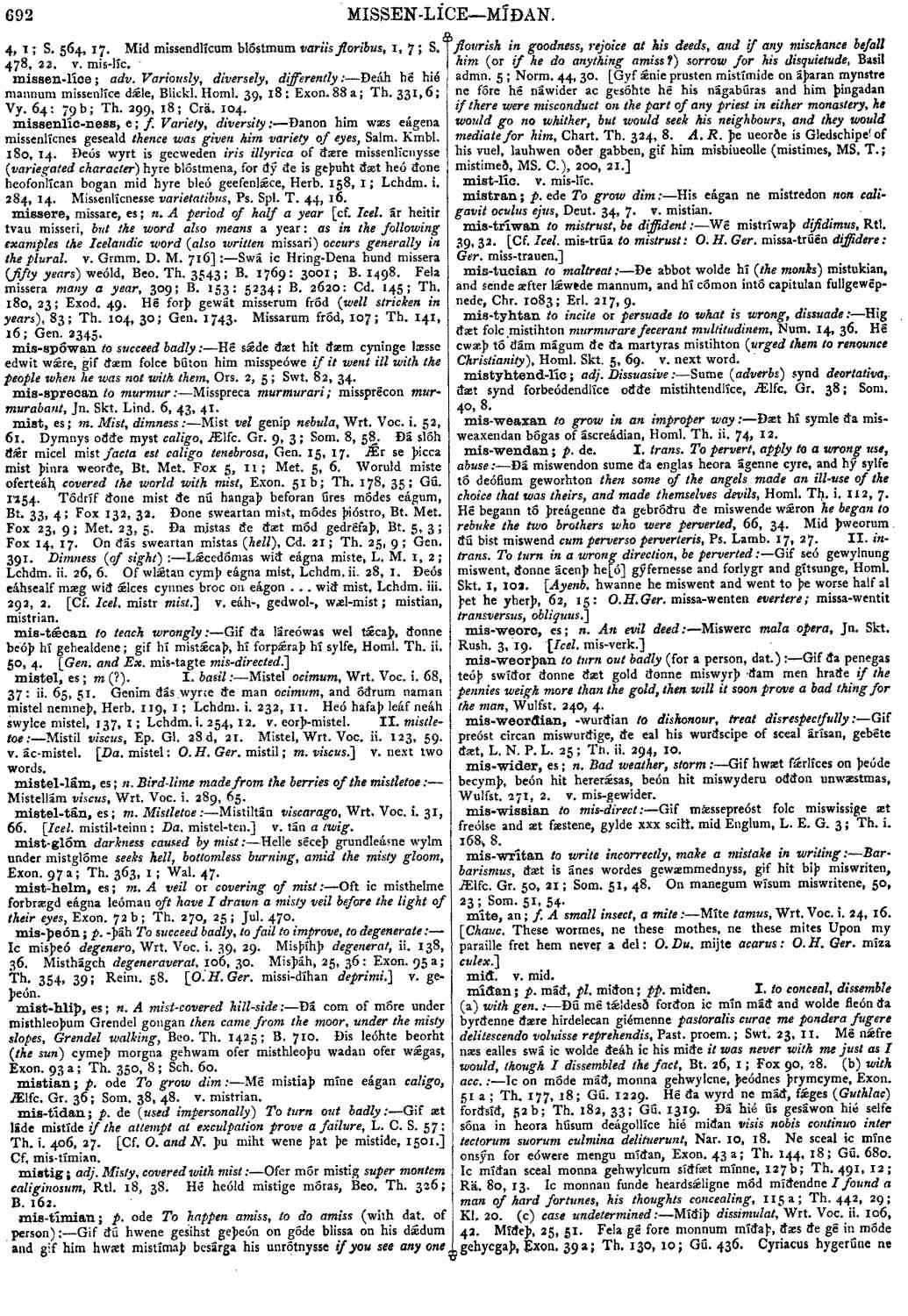míðan
- verb [ strong ]
-
Ðú mé tǽldesð forðon ic mín máð and wolde fleón ða byrðenne ðære hirdelecan giémenne
pastoralis curae me pondera fugere delitescendo voluisse reprehendis,
- Past. proem. ;
- Swt. 23, 11.
-
Mé nǽfre næs ealles swá ic wolde ðeáh ic his miðe
it was never with me just as I would, though I dissembled the fact,
- Bt. 26, 1 ;
- Fox 90, 28.
-
Ic on móde máð, monna gehwylcne, þeódnes þrymcyme,
- Exon. 51 a ;
- Th. 177, 18 ;
- Gú. 1229.
-
Hé ða wyrd ne máð, fǽges ( Guthlac ) forðsíð,
- 52 b ;
- Th. 182, 33 ;
- Gú. 1319.
-
Ðá hié ús gesáwon hié selfe sóna in heora húsum deágollíce hié miðan
visis nobis continuo inter tectorum suorum culmina delituerunt,
- Nar. 10, 18.
-
Ne sceal ic míne onsýn for eówere mengu míðan,
- Exon. 43 a ;
- Th. 144, 18 ;
- Gú. 680.
-
Ic míðan sceal monna gehwylcum síðfæt mínne,
- 127 b ;
- Th. 491, 12 ;
- Rä. 80, 13.
-
Ic monnan funde heardsǽligne mód míðendne
I found a man of hard fortunes, his thoughts concealing,
- 115 a ;
- Th. 442, 29 ;
- Kl. 20.
-
Míðiþ
dissimulat,
- Wrt. Voc. ii. 106, 42.
-
Míðeþ,
- 25, 51.
-
Fela gé fore monnum míðaþ, ðæs ðe gé in móde gehycgaþ,
- Exon. 39 a ;
- Th. 130, 10 ;
- Gú. 436.
-
Cyriacus hygerúne nemáð tó Gode cleopode
Cyriacus concealed not the secret of his mind, but cried to God,
- Elen. Kmbl. 2196 ;
- El. 1099.
-
Hwílum biþ gód tó míðanne his hiéremonna scylda
aliquando subjectorum vitia prudenter dissimulanda sunt,
- Past. 21, 1 ;
- Swt. 151, 8.
-
Miðene
concealed,
- Bd. 4, 27 ;
- S. 604, 24.
-
Ðonne biþ sóna sweotol æteówod on him ðæt ǽr deágol máð
then at once will be made manifest in him what before lay hid,
- L. M. 2, 66 ;
- Lchdm. ii. 298, 8.
-
Monig þing ge egeslíce ge willsumlíce ðe óðre men miðon
multa, quae alios laterent, vel horrenda, vel desideranda,
- Bd. 5, 12 ;
- S. 627, 30.
-
Míðende
dilitiscendo,
- Wrt. Voc. ii. 140, 39.
-
Ic þurh múþ sprece, hleoðre ne míðe
I speak with my mouth ... refrain not from sound,
- Exon. 103 a ;
- Th. 390, 20 ;
- Rä. 9, 4.
-
Wulf on walde wǽlrúne ne máð,
- Elen. Kmbl. 56 ;
- El. 28.
-
Ne míð ðú for menigo
forbear not on account of the multitude,
- Andr. Krpbl. 2419 ;
- An. 1211.
-
Ne mæg ic ðý míðan,
- Exon. 125 a ;
- Th. 481, 1 ;
- Rä. 64, 10.
Bosworth, Joseph. “míðan.” In An Anglo-Saxon Dictionary Online, edited by Thomas Northcote Toller, Christ Sean, and Ondřej Tichy. Prague: Faculty of Arts, Charles University, 2014. https://bosworthtoller.com/23018.
Checked: 1